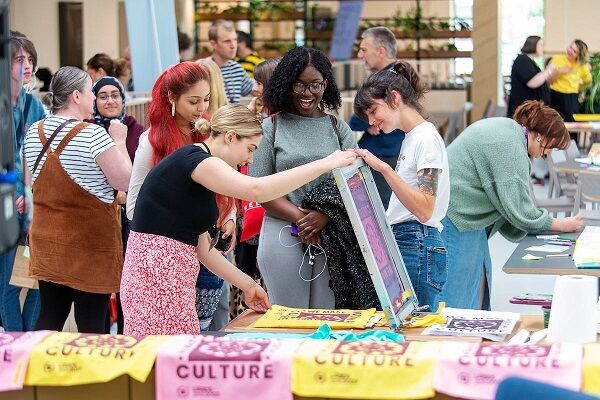Six-figure funding awarded by Arts Council England to PLAY creative education scheme

£788,000 award will fund a series of ambitious children’s and young people’s projects, as part of the LEEDS 2023 cultural celebrations
Arts Council England (ACE) has awarded the University of Leeds’ Cultural Institute £788,000 to fund its PLAY creative education scheme as part of LEEDS 2023.
A series of ambitious projects for children and young people will be delivered by lead partner LEEDS 2023 as part of its cultural celebrations taking place next year, engaging over than 68,000 participants over the 12 months. The events will fully reflect Leeds’ diverse communities and provide an impetus for a longer-term step-change towards establishing a funded creative education across the city.
Thanks to the funding, PLAY (Participation, Learning & Arts for Youth) will support skills and creative learning through the meaningful engagement of children and young people, as part of LEEDS 2023’s 12 signature projects and its wider education programme.
The over-arching education programme is made up of activities for, and planned by, young people that will provide opportunities for every Leeds school to participate. An estimated 905,000 people will be given a chance to volunteer, engage with directly or online, or witness at least one element of the LEEDS 2023 youth-focused programme during the Year of Culture, all supported by the ACE funding.
With one in 18 future jobs predicted to be in the creative sector, there are two children in every Leeds classroom whose futures can be brighter thanks to this funding and our longstanding cultural partnership with LEEDS 2023.
Professor Frank Finlay, Director of the Cultural Institute said: “The University of Leeds aims to play a positive role in society, and making an impact on local and global communities is a vital goal of our strategy. The long-term benefits of such significant ACE funding for youth projects across Leeds is profound. In addition to the young people who get to experience PLAY as artists, volunteers, event organisers and participants, they will also be the beneficiaries of a better coordinated creative and cultural education, with direct pathways to training and employment.
“We know employers are looking for confident, future-ready, global citizens who can be the potential cultural leaders of tomorrow. With one in 18 future jobs predicted to be in the creative sector, there are two children in every Leeds classroom whose futures can be brighter thanks to this funding and our longstanding cultural partnership with LEEDS 2023.”
LEEDS 2023 is being delivered by the independent charity, Leeds Culture Trust, in collaboration with the University of Leeds, Leeds Cultural Education Partnership, Leeds City Council and Leeds Learning Alliance. LEEDS 2023 will champion a city-wide transformation in creative and cultural education and skills, which the partners will go on to maintain and develop in future years.
This funding from Arts Council England is another resounding endorsement of the social and economic value that culture can add to a city region. More than £17.7m has been raised to date towards the Year of Culture, through Leeds City Council, as well as private and public sector investment.
Pete Massey, Director Yorkshire and Northern Economy & Partnerships said “The Arts Council’s Let’s Create strategy has a strong focus on enabling children and young people to engage with arts and culture, so I’m very pleased that we are supporting the University of Leeds’s Cultural Institute for its PLAY creative education scheme. While the focus of this funding is Leeds’s imminent and exciting year of culture which will enable the city’s children and young people to make and enjoy fantastic art and culture, it will also lay the foundations for Leeds to become a creative place to grow up for the long term.”
LEEDS 2023 promises to bring a multitude of creative experiences across the three elements with “Awakening” influencing Part One (January to April), “Playing” being the focus of Part Two (May to August), and finally “Dreaming” a forward-looking end to the year (September to December).